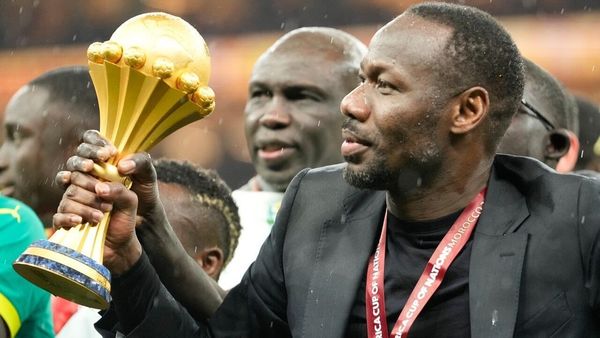After she finished high school, Wandi Cao's mother had a piece of advice about her looks.
"My mother tried to persuade me to do the double-eyelid plastic surgery, so that 'my life would be much easier'," Ms Cao told ABC's China Tonight.
Growing up in China, the 27-year-old model never thought she could "fit the mainstream beauty standards".
"They thought my high cheekbones would curse my husband and my eyes are small," she said.
"But I thought that wouldn't change my personality and abilities, and I wouldn't necessarily look prettier, so I didn't do it."
Now based in Sydney, Ms Cao moved to Melbourne in 2016 and started modelling.
In Australia, she received numerous compliments about her looks from photographers and designers.
It took her some time to realise these comments weren't simply "being polite", but were genuine.
Yet she never thought her face would become problematic in China one day.
Earlier this month, China's National Radio and Television Administration required the country's TV companies to "adhere to maintain the correct political, moral, and aesthetic direction".
The directive didn't go into detail about the "correct" aesthetic, but it urged companies to reject "pathological plastic surgery, 'sissy men' aesthetics, excessive makeup, excessive filter use, and other negative aesthetics".
It comes after widespread online boycotts against models and even fictional cartoon characters with small eyes.
Nationalistic critics have accused Western brands of caricature and stereotyping — including using makeup to exaggerate narrow eyes — and Chinese companies of buying into a Western perception of Chinese traits.
Furious netizens blasted the Chinese snack brand Three Squirrels for employing a model they dubbed a "slant eye" (mi-mi-yan) late last year.
One Weibo user said: "It is an insult to China that ignores Chinese history and culture. We do not know which nation's aesthetics the slanted eye modelling caters to, but at least this is a one-sided, biased, and insulting phenomena."
"All of the cultural traitors are secretly distorting the national aesthetic," another said.
Some accused the Chinese animation I Am What I Am, which centres on traditional lion dance, of making the characters' eyes appear to be "squinting" to insult Chinese viewers last year.
Primary school mathematics textbooks that have been in use for nearly 10 years have been attacked for the wide-set drawn eyes of the children in the illustrations. China's Ministry of Education announced they will replace all the textbooks in September.
To Ms Cao, the online firestorm over eye shape was "outrageous".
Struggling under China's changing beauty standards
In recent years, many well-known international fashion brands have been criticised in China for using models with small eyes.
Dior, for example, was attacked last November for exhibiting photos from 2012 with thin-eyed models in its art show in Shanghai.
After receiving criticism, Dior then issued an apology on its Weibo account and took down all the pictures.
Man Chen, who took the photos and was once regarded as China's most successful fashion photographer, also apologised, saying the photos were taken in her "early days" when her "views of art were not yet formed".
Similarly, Italian luxury brand Gucci removed advertisements featuring Asian models holding bamboo-handled handbags from their social media pages after they were criticised by nationalistic critics.
The Global Times, China's jingoistic state-run tabloid, claimed the Gucci model's make up amplified "the 'Asian face' typically depicted in the Western narrative."
Pan Wang, a senior lecturer in Chinese and Asian Studies at the University of New South Wales, said she "wasn't surprised to see the controversies" around these images.
"To some people, they are certainly offended by that."
However, Dr Wang said some critics may be overreacting, as "some advertisers and recruited models do not intend to distort the image of Chinese [people] and China".
"It's not good to see that they're spreading their views around and imposing their view on others with the intention of creating a cultural or ideological war between China and Western cultures," she said.
Dr Wang added that some comments were bordering on body shaming.
"Many people are just born with ‘slanted eyes’ and there is nothing wrong with that."
How did beauty standards become a battleground in China?
In ancient China, long and thin eyes were seen as beautiful.
It wasn't until much later that this body feature started to be used as an insult against Asian people and associated with the racist "Yellow Peril" ideology.
In popular culture, this was embodied in the fictional supervillain Fu Manchu, who was created by the English novelist Sax Rohmer pre-World War I and featured in films in the 1920s.
But because most Western films were banned in China before the Cultural Revolution ended in 1976, few in China were familiar with the character and the associated insult.
After the country's economic transformation got underway in the late 1970s, Chinese society started to adapt to Western culture and its beauty standards.
Nowadays, celebrities with double eyelids and a bridged nose, such as Uyghur actress Dilraba Dilmurat and Fan Bingbing, are upheld as prime examples of Chinese beauty.
Meanwhile, more people are using cosmetic surgery or make up to change their appearances to fit the standard.
According to Deloitte's estimates, China's cosmetic surgery market has been growing since 2012 and will reach 311.5 billion Chinese yuan (about $68.5 billion) in 2023.
Dr Wang said the Chinese government now wants to "strengthen its national identity through positive image building".
"[The] 'slanted eyes' image doesn't fit in this," she said.
"People do not want others to use a 'slanted-eye' image to label China and uglify the Chinese people."
Brands caught in the middle of a beauty clash
The directive from the Radio and Television Administration also required TV productions "to not arbitrarily use, follow or copy foreign styles".
However, from a nationalistic view, the way many average Chinese people look has been interpreted as a bad representation of China.
The contradiction raises a question for brands and businesses: How should they find a balance when trying to market their products in China?
Ashley Galina Dudarenok, a China marketing expert based in Hong Kong, saw the controversies over the models' eyes as "a clash between what the brand wanted to showcase and what China's beauty standards were".
"That balance can be found if brands were to look at their own artistic values and what the Chinese people value," she said.
"Chinese consumers know that they have the power in that they make up a large part of the market that foreign brands are driving for.
"This is why it's so important for brands to have a test market or a reviewing system for products, campaigns, or even social media posts. Launching anything without proper testing and evaluation is a sure way for it to backfire."
But Ms Dudarenok also said most Chinese customers still "focus on quality and want the best products".
"It's inevitable when working across cultures because brands occasionally fall short even in their own cultures."
Additional reporting by Bang Xiao
Watch the story on tonight's China Tonight at 9:35pm AEST on ABC TV, or stream on ABC iview.







